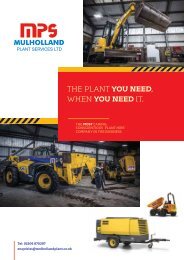BAA MAGAZINE SUMMER 2017 DRAFT 4
Create successful ePaper yourself
Turn your PDF publications into a flip-book with our unique Google optimized e-Paper software.
participants more likely to go ahead with<br />
getting HAs.<br />
Alternative rehabilitation: Some<br />
were more willing to use HAs if found<br />
in places not associated with disability,<br />
and available from everyday locations<br />
eg. high street shops. Therefore,<br />
promotion of alternative devices as a<br />
substitute for HAs was not beneficial,<br />
as it was seen as less effective and<br />
time consuming.<br />
Knowledge of benefits: Allowing<br />
people to experiment with HAs to<br />
appreciate the benefits may encourage<br />
people to get and use them.<br />
Limitations<br />
Limitations of this study are fully<br />
discussed in the paper but include<br />
that the study focused on those who<br />
had sought help; ideally, it would<br />
have recruited people experiencing<br />
early signs of HL, but it is difficult to<br />
recruit those who have not identified<br />
themselves as experiencing HL, so the<br />
data may not represent the views of<br />
those less willing to seek help.<br />
Next steps<br />
Action on Hearing Loss are working in a<br />
number of ways to address this issue:<br />
• Working on the task and finish groups<br />
for the Action Plan on Hearing Loss<br />
who are working towards filling the<br />
evidence gaps on hearing screening<br />
as a step towards securing a national<br />
hearing screening programme and<br />
promoting opportunistic screening.<br />
• Creating materials to encourage and<br />
support friends and families to initiate<br />
proactive discussions with people<br />
who may have unaddressed hearing<br />
loss.<br />
• Holding hearing screening events<br />
and promoting our hearing check.<br />
• We will be holding a webinar to<br />
bring together international experts<br />
from different disciplines to discuss<br />
methods to increase uptake of<br />
support for hearing loss, share<br />
evidence and create solutions.<br />
Conclusion<br />
There are several interventions which<br />
can be piloted, focusing on realisation.<br />
Awareness of the benefits of taking<br />
action and creating social norms are<br />
also important. If you would like to be<br />
involved in the webinar, please contact<br />
Crystal Rolfe for more information.<br />
References<br />
Davis, A., Smith, P., Ferguson, M.,<br />
Stephens, D. and Gianopoulos, I.<br />
(2007). Acceptability, benefit and costs<br />
of early screening for hearing disability:<br />
a study of potential screening tests and<br />
models. National Coordinating Centre<br />
for Health Technology Assessment,<br />
University of Southampton.<br />
Knudsen, L.V., Öberg, M., Nielsen,<br />
C., Naylor, G. and Kramer, S.E. (2010).<br />
Factors influencing help seeking,<br />
hearing aid uptake, hearing aid use and<br />
satisfaction with hearing aids: A review<br />
of the literature. Trends in Amplification,<br />
14(3), 127–154.<br />
Meyer, C. and Hickson, L. (2012).<br />
What factors influence help-seeking<br />
for hearing impairment and hearing aid<br />
adoption in older adults? International<br />
journal of audiology, 51(2), 66–74.<br />
Michie, S., van Stralen, M.M. and<br />
West, R. (2011). The behaviour change<br />
wheel: a new method for characterising<br />
and designing behaviour change<br />
interventions. Implementation Science,<br />
6(1), 42.<br />
Contact: Crystal Rolfe: crystal.rolfe@<br />
hearingloss.org.uk<br />
Publication: Rolfe, C. and Gardner, B.<br />
(2016). Experiences of hearing loss and<br />
views towards interventions to promote<br />
uptake of rehabilitation support among<br />
UK adults. International Journal of<br />
Audiology, 55(11), 666673.<br />
Early Bird Allocation<br />
Almost Gone!<br />
On the Programme<br />
Sharing decisions in Tinnitus: Preference, Information and<br />
Approaches | Helen Pryce<br />
Audiologist Guided Internet-Based CBT for Tinnitus:<br />
Feasible, Acceptable and Effective | Eldre Beukes<br />
ANNUAL CONFERENCE 07.09.17<br />
Thursday 7 September <strong>2017</strong><br />
Sheffield Hallam University | City Campus<br />
Tickets from £75<br />
Full details available at<br />
www.tinnitus.org.uk/btaconf<strong>2017</strong><br />
#BTAConf<strong>2017</strong><br />
NEW! Workshops<br />
‘Practice guidance for tinnitus in adults’<br />
‘How we manage hyperacusis in children’<br />
‘Getting a support group from good to great’<br />
‘Eye movement desensitisation and reprocessing therapy &<br />
tinnitus’<br />
‘The relationship between tinnitus, hyperacusis & anxiety in<br />
children’<br />
‘Dealing with challenging support group members’<br />
Round Table Q&A<br />
Tinnitus Toolkit: Person-Centered Care in Tinnitus<br />
Management | Cherilee Rutherford<br />
Evaluation of a Cognitive Model of Tinnitus Distress: Is it<br />
Accurate and is it Useful? | Lucy Handscomb<br />
Mobile Applications for Management of Tinnitus |<br />
Magda Sereda<br />
Shapiro Prize & Poster Competition<br />
<strong>BAA</strong> <strong>MAGAZINE</strong> / <strong>SUMMER</strong> <strong>2017</strong> / 15



